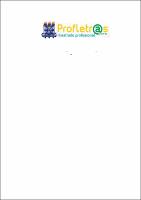| Compartilhamento |


|
Use este identificador para citar ou linkar para este item:
http://tede2.uefs.br:8080/handle/tede/694| Tipo do documento: | Dissertação |
| Título: | Mínimas palavras, máxima expressão: o miniconto como prática de leitura e escrita |
| Autor: | Oliveira, Luís Cláudio de Lima  |
| Primeiro orientador: | Oliveira, Humberto Luiz Lima de |
| Resumo: | Este trabalho apresenta uma proposta de intervenção pedagógica para o ensino de Língua Portuguesa por meio de uma sequência didática que articula, em forma de oficinas, diversas atividades de leitura, discussão, pesquisa, produção escrita e reflexão sobre a escrita, em torno do emergente gênero miniconto, tendo em vista o desenvolvimento da competência discursiva, entendida como a capacidade de compreensão e produção de textos orais ou escritos de acordo com o gênero e as diversas situações de interação e circulação, de alunos do 9º ano do Ensino Fundamental com dificuldades nas práticas de leitura e escrita. Para isso, a proposta está fundamentada nos estudos de Antunes (2003, 2009, 2010), Marcuschi (2008), Koch e Elias (2014 e 2015), Kleiman (2008), Manguel (2009), como também nas orientações dos PCN (1998), no que se refere a concepção de língua e linguagem, bem como de leitura e escrita. Por tratar-se de uma proposta de leitura literária, o texto também se fundamenta nas contribuições de Yunes (2012), Cosson (2014), Jouve (2012), Soares (2001), Todorov (2009), Candido (2011). Quanto às especificidades do gênero em estudo, a intervenção se fundamenta nas concepções de Moisés (1970), Silva (2003), Gotlib (1985), Spalding (2007 e 2008), Píglia (2004) entre outros. A sequência didática é uma adaptação do que é proposto por Dolz, Noverraz e Schneuwly (2004) e Costa-Hübes (2009). O ensino de língua materna com foco no gênero miniconto é defendido nesse trabalho, devido ao fato de possibilitar ao leitor o exercício da reflexão sobre si, o outro e o mundo, mobilizando suas experiências de vida e sua imaginação, para compreender essa forma muito breve de composição que muito mais sugere do que narra. É um gênero que realmente favorece um ensino de língua em interação e contribui para a formação do pensamento crítico. |
| Abstract: | This work presents a proposal for pedagogical intervention for the teaching of Portuguese Language through a didactic sequence that articulates, in the form of workshops, several activities of reading, discussion, research, writing production and reflection on writing, around the emerging microfiction genre in order to develop discursive competence, understood as the ability to comprehend and produce oral or written texts according to gender and the different situations of interaction and circulation, of students from the 9th grade of Primary School with difficulties in the practices of reading and writing. For this, the proposal is based on the studies of Antunes (2003, 2009, 2010), Marcuschi (2008), Koch and Elias (2014 and 2015), Kleiman (2008), Manguel 1998), with regard to the conception of language and language, as well as reading and writing. Since it is a proposal of literary reading, the text is also based on the contributions of Yunes (2012), Cosson (2014), Jouve (2012), Soares (2001), Todorov (2009) and Candido (2011). As for the specificities of the genre under study, the intervention is based on the conceptions of Moses (1970), Silva (2003), Gotlib (1985), Spalding (2007 and 2008), Píglia (2004) among others. The didactic sequence is an adaptation of what is proposed by Dolz, Noverraz and Schneuwly (2004) and Costa-Hübes (2009). The teaching of mother tongue with a focus on the microfiction genre is defended in this work, due to the fact that it allows the reader to exercise the reflection about himself, the other and the world, mobilizing his life experiences and his imagination, to understand this very brief form of composition that much more suggests than it narrates. It is a genre that really favors language teaching in interaction and contributes to the formation of critical thinking. |
| Palavras-chave: | Língua Portuguesa Miniconto Leitura Escrita Portuguese Language Reading Writing |
| Área(s) do CNPq: | LETRAS::LINGUA PORTUGUESA |
| Idioma: | por |
| País: | Brasil |
| Instituição: | Universidade Estadual de Feira de Santana |
| Sigla da instituição: | UEFS |
| Departamento: | DEPARTAMENTO DE LETRAS E ARTES |
| Programa: | Mestrado Profissional em Letras |
| Citação: | OLIVEIRA, Luís Cláudio de Lima. Mínimas palavras, máxima expressão: o miniconto como prática de leitura e escrita. 2018. 173 f. Dissertação (Mestrado Profissional em Letras)- Universidade Estadual de Feira de Santana, Feira de Santana, 2018. |
| Tipo de acesso: | Acesso Aberto |
| URI: | http://tede2.uefs.br:8080/handle/tede/694 |
| Data de defesa: | 23-Mar-2018 |
| Aparece nas coleções: | Coleção UEFS |
Arquivos associados a este item:
| Arquivo | Descrição | Tamanho | Formato | |
|---|---|---|---|---|
| Dissertação pdf.pdf | Arquivo em texto completo. | 12,3 MB | Adobe PDF |  Baixar/Abrir Pré-Visualizar |
Os itens no repositório estão protegidos por copyright, com todos os direitos reservados, salvo quando é indicado o contrário.




